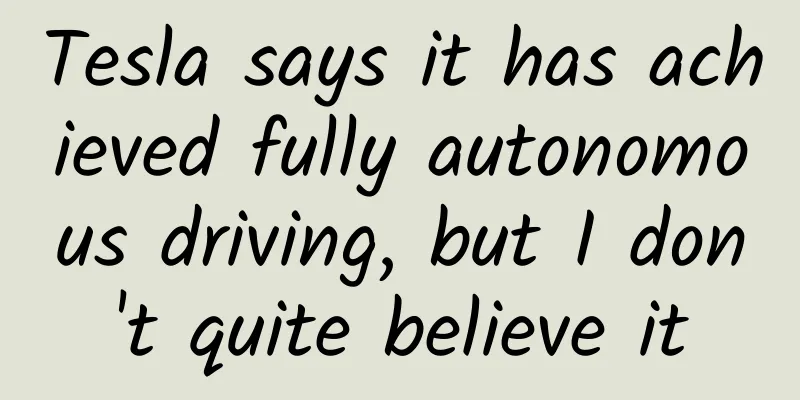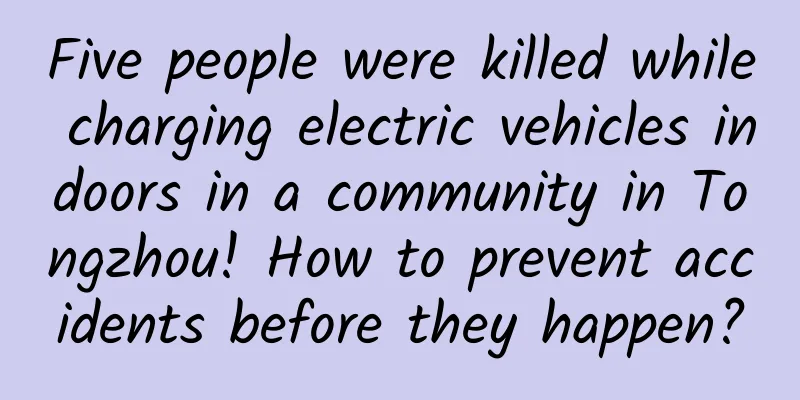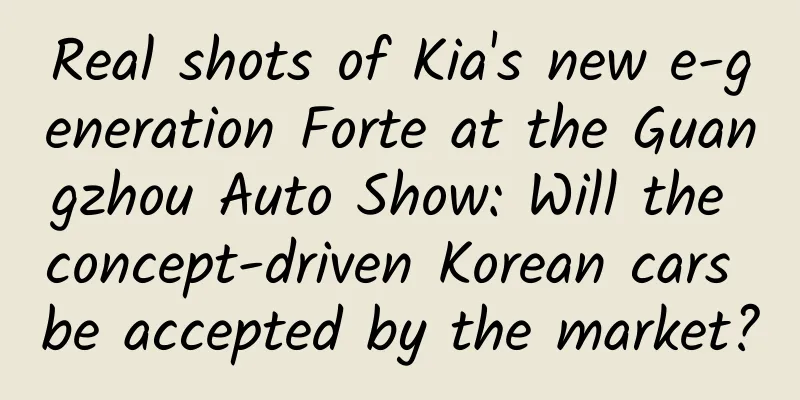Tesla says it has achieved fully autonomous driving, but I don't quite believe it

|
Tesla's autonomous driving has always attracted the attention of the industry, and many people believe that Tesla has achieved or will be the first to achieve autonomous driving. However, is this really the case? I have been engaged in the research and development of autonomous driving controllers for some time, and I would like to share my views. What is autonomous driving? There is no mandatory standard for autonomous driving at present. There is no European standard, no American standard, and even less Chinese standard! This leaves a lot of room for interpretation of "autonomous driving"! Is the ability to automatically accelerate and brake considered autonomous driving? Is the ability to automatically turn considered autonomous driving? To what extent is it considered autonomous driving? Although there are no mandatory standards, the National Highway Traffic Safety Administration (NHTSA) and the Society of Automotive Engineers (SAE) have relatively clear instructions on this. It is basically divided into 4-5 levels. There is a lot of information on the Internet, but it is briefly described as follows: Level 0: No support system Level 1: Basic assistance systems such as adaptive cruise control and lane keeping. Level 2: A combination of various level 1 systems, called a semi-automatic system. It belongs to the category of assisted driving. Level 3: Conditional autonomous driving system, a true autonomous driving system, but only works under specific conditions and still requires the driver to take over. Level 4 (Level 5): Highly (fully) automated driving, or even unmanned driving. The biggest difference between Level 2 and Level 3 comes from whether the driver is required to be responsible. Level 2 requires the driver to be responsible, while Level 3 does not. If the car manufacturer requires the driver to keep his hands on the steering wheel and pay attention to the road conditions at all times, then it is undoubtedly a Level 2 system. Attention! The driver is responsible! It is not the driver taking over! Level 3 still requires the driver to take over, and the driver taking over is the difference between Level 3 and Level 4 and Level 5! The most advanced systems for all models currently on the market, including those of Tesla, Volvo, Mercedes-Benz, Audi and other brands, are only level 2, and level 3 systems are not yet available anywhere in the world! There is information that Audi will be the first brand to mass-produce Level 3 autonomous driving, as it has signed an exclusive supply agreement with a LiDAR supplier, and LiDAR is one of the necessary sensors for autonomous driving. However, according to its release schedule, mass production or listing will take at least one or two years. So what exactly is so difficult about the Level 3 system? It can be clearly said that the difficulty lies in the need to be responsible for the accident! For the Level 2 system, various fancy functions can be realized, but they all require the driver to be in the loop to monitor the operation of the vehicle. The driver is not in the loop of the Level 3 system, and all control decisions are made by the vehicle. Therefore, from the design architecture to the control logic, there is a world of difference from the Level 2 system! So I often hear people ask, why can't the Level 3 system do this or that, and the functions are not as good as the Level 2? Once you truly understand the difference between Level 3 and Level 2, this question is not difficult to answer. Functionality is not the focus of Level 3 systems, but reliability and safety are. How far is Level 3? How far is Level 4 and Level 5? Level 3 systems will be mass-produced in the next 5-8 years. As for Level 4 and Level 5, which do not require the driver to take over, it will probably take at least 20 years for mass production. No matter how I explain Tesla's so-called "highly automated driving", there will always be fans who will scorn my arguments and firmly believe that Tesla can do it. However, we only need to pay attention to whether Tesla cars equipped with this system will allow drivers to let go of their hands and do other things while driving after they are launched on the market. If not, then it is a Level 2 system! Not even Level 3, let alone Level 4 or Level 5! Technical Analysis of Tesla Systems After breaking up with Mobileye, Tesla chose Nvidia and installed cameras in all directions. However, with current technology, the performance of cameras is very limited and not safe enough. Some people would say that artificial intelligence and deep learning are indeed the best use of these technologies, but these technologies themselves are not mature and the performance improvement is currently very limited. Autonomous driving is a system with extremely high safety requirements and does not allow any form of failure (there are redundant systems to ensure safety after failure). And the camera: 1. Insufficient adaptability to special situations. For example, in our tests, we found that the recognition rate would drop when facing strong light or strong ground reflection. 2. Auxiliary lighting is needed at night. The forward-facing camera has a headlight, but the cameras in other directions need additional lighting to work in the dark. When the lighting is insufficient, the recognition rate and recognition distance are greatly reduced. 3. Bad weather, greatly affected by rain, snow and fog. Radar laser is relatively less affected than camera. 4. Recognition itself has limitations, such as the target being obscured, the target contrast being too low, or the target appearing suddenly. Don’t expect the camera to recognize objects that are not visible to the naked eye. Think about Tesla’s first accident. The main problem was that the camera did not recognize and confirm the lateral movement of the truck. Therefore, it is indeed impossible to achieve the safety and reliability required for Level 3 autonomous driving by relying solely on cameras. Tesla’s system is more like a low-cost, high-performance Level 2 system. It’s not that Tesla’s system is bad. Tesla’s Autopilot is the best performing and most reasonably priced Level 2 system I’ve ever tested. Tesla is also the only OEM that is currently able to break free from the constraints of traditional suppliers. However, to be realistic, I really don’t think that Tesla’s system can reach Level 3, and Level 5 is simply impossible! As a winner of Toutiao's Qingyun Plan and Baijiahao's Bai+ Plan, the 2019 Baidu Digital Author of the Year, the Baijiahao's Most Popular Author in the Technology Field, the 2019 Sogou Technology and Culture Author, and the 2021 Baijiahao Quarterly Influential Creator, he has won many awards, including the 2013 Sohu Best Industry Media Person, the 2015 China New Media Entrepreneurship Competition Beijing Third Place, the 2015 Guangmang Experience Award, the 2015 China New Media Entrepreneurship Competition Finals Third Place, and the 2018 Baidu Dynamic Annual Powerful Celebrity. |
<<: Is Toutiao worth $10 billion?
Recommend
What harm will excessive plant growth and high oxygen concentration cause to other organisms?
Oxygen was formerly known as "nourishing air...
Win10 vs Win8: A must-upgrade for DX12 games
It's difficult to figure out Windows 10 perfo...
5 Tips for Using Tik Tok to Master Film and Television Marketing!
Since Tik Tok became popular, there is another ne...
GMGC2016 Shengji Network will be the diamond sponsor to support the 5th Global Mobile Game Conference
The fifth Global Mobile Game Conference GMGC2016, ...
The color TV market is expected to achieve a turnaround in the second half of the year. Can the loosening of LCD panel prices become a breakthrough for the industry?
As the second quarter comes to an end, the situat...
App Store rankings in Q1 2018: TikTok takes the top spot, while Honor of Kings remains strong
In 2018, a quarter has passed in the blink of an ...
How much does it cost to install a 400 phone? How much does it cost to install a 400 phone number?
After understanding how to apply for the 400 hotl...
Wang Yan Shoulder, Back and Chest Training Camp
Wang Yan Shoulder, Back and Chest Training Camp R...
The Netherlands left the World Cup but this...
In the World Cup, many countries' jerseys hav...
Three tips for operating corporate Toutiao accounts!
Traditional Toutiao account operations mostly inv...
How much does it cost to customize the Wuhai online recharge mini program?
There is no fixed price for the customized Wuhai ...
After watching the concert, how many mobile phone cameras were "burned" by lasers?
Audit expert: Meng Meng Associate Researcher, Ins...
Java Thread Interview Questions
[[147712]] Below are some Java thread-related int...
How do K12 online education products achieve user growth?
This article mainly discusses the response strate...









